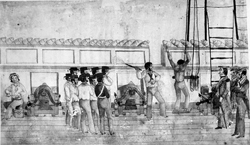September 28, 1850

"Punishment on Board Ship" from the "Journal of a Cruise on the USS Cyane," 1842-43, By William H. Myers, Gunner
In March 1850, Herman Melville published White Jacket, or the World in a Man-of-War, a novelized memoir of his experiences in the South Seas aboard a U.S. Navy vessel.
Melville’s vivid depiction of flogging, a brutal staple of 19th century naval discipline, led New Hampshire Sen. John P. Hale to renew efforts to have Congress ban the “cat-o’-nine-tails” as a barbarous anachronism.
Flogging, which was prescribed in the original Articles of War written in 1775 by John Adams, was outlawed in the Army in 1812 but revived two decades later as punishment for desertion.
Navy officials, meanwhile, vigorously defended flogging against its critics—most often abolitionists—as the only practical means of controlling “the turbulent and ill-assorted characters common on board every ship of war.”
In 1842, a Navy court-martial convicted Capt. Uriah P. Levy, an outspoken foe of the lash, for failing to flog a disrespectful cabin boy.
Still, at Hale’s urging, Congress banned flogging on all U.S. ships in September 1850. And in July 1862, in a bill authorizing African-Americans to serve in Union militias, it was finally banned from all branches of the military.



